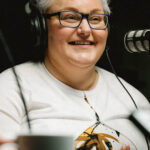With the rise of digital technology and the COVID-19 pandemic, it’s easy to fall into a pattern of exclusively engaging with church and community online. However, as Christians, we’re called to gather together and to stir one another up to love and good works in physical community. So how do we break out of our comfort zones and embrace meaningful connections with other believers, as God intended?
In this episode of Glo, Blair Linne, Aixa de López, Sharon Dickens, and Soojin Park discuss the trend of online church engagement, why some of us might find online church more comfortable, God’s design for connection and community, and why isolation is dangerous for our hearts. You’ll be both challenged and encouraged to pursue genuine biblical relationships in a world increasingly dominated by technology.
Episode time stamps:
- The global pandemic and its effects on the church (1:15)
- Coming back to church after the pandemic (4:42)
- Fears preventing people from coming back to church (8:28)
- Dangers of relying on online community for spiritual growth (11:59)
- The importance of being connected to a community of Christ followers (14:50)
- To those who have become disconnected, say, “I miss you” (16:58)
- Created for worship together (19:24)
- Online resources that have helped point the hosts to Christ (20:34)
Transcript
The following is an uncorrected transcript generated by a transcription service. Before quoting in print, please check the corresponding audio for accuracy.
Blair Linne
You have to be invested, you have to be in a community of Christians in order to live out the commands that are in the New Testament. You know, Satan wants us to be isolated if he can separate you. And then he can tell you his lies, and he can have a place in your life knowing that He desires to kill, steal and destroy. And so often he will tempt us in that way, we have to fight against that to say, No, I’m not my own. I then bought with a price and that price, the blood of Jesus, it joins me with other believers. Well, ladies, were grateful to be here, again, being able to have these conversations together. For our podcast glow, which is a podcast from the gospel coalition Podcast Network. We’re for women from different parts of the world with different experiences and backgrounds. And we have this common goal, which is to make much of Christ to magnify Him, and talk about what he’s doing in our lives and ministries and around the world. And today, we’re actually going to be talking about church community in a digital age. My name is Blair Lynn, I’m here joined with my sister, Aisha de Lopez, Sharon Dickens, and this conversation is going to be led by our sister Sujin. Part.
Soojin Park
Well, I feel like we can’t talk about the global church without talking about the global pandemic, which affected all of us in 2020, and on and we all know that it changed so much of our lives. You know, we all worked from home, or the kids all went to school from home. And we even went to church from home. And I praise God that many of us had access to technology so that we could continue to worship. But we all know that there was a lot loss in that process of not being able to be in person and do live together with our church communities and, and praise God, I think we’re out of the thick of the pandemic, and many of our churches, for a while, maybe year and a half have been transitioning back into in person. But I feel like the pandemic has changed the world forever, and even church, and we’re in this kind of new digital era. And while for some people, I think doing Church Online was just a temporary solution, I think some people have found it to be their new norm. And so we know people who are still engaging Church Online. And as for myself, I’ve been on this is my fifth year on staff with my church. And so most of my tenure at my church has been through the pandemic. And so this is something I’ve thought through a lot, you know, people who are not coming back to church or have chosen to stay online, how do we engage them as part of our local church in person? And so I would love to just open the dialog and ask you all, why do you think people are attracted to engaging online as their primary source of community? What do you guys think?
Aixa De Lopez
I think it’s human nature to hide away way. And it’s more comfortable. To sum it, it was a way to engage without risk. And so we all have different stories. And for some, it’s a lifeline, that, you know, having online access is actually a safe way to approach church. But to be real, a lot of us use the, you know, the pandemic and COVID as a way to excuse our lack of engagement with real people in real conversations and face to face and accountability. And so, I think it’s a mixture of things, and it plays out differently for everyone. But in general, I that’s what my, you know, perspective is, yeah, I agree
Blair Linne
with that. I think it is easy to get comfortable to, you know, you get settled kind of in the rhythm of being at home. And so it makes it much more difficult to get up. It almost feels like laborious to, like, Get up and get ready to get out of the door, you know, on a Sunday morning. And so I think we we just get comfortable. And then I also think that for some people, it’s just fear, there’s still people who are wrestling with real fears surrounding COVID and the unknown. And, you know, for them, they may be still haven’t really left their home, you know, still haven’t engaged others, because maybe they have health issues, or they just have concerns. And so yes, I think fears holding people back as well.
Soojin Park
I mean, in your context in Guatemala and Scotland, have you noticed that there are still many people who are choosing to engage only online or is that something we’re just seeing in the US?
Sharon Dickens
I think the answer to this is both. And so I also think it depends on where the area is. And we were recently my pastor and I were on one of those zoom calls. And it was one of these questions they asked, How do you reengage in your church? And from our perspective, that wasn’t hard. We were done. Split to get back to church. So as a personal call a congregation we were desperate to be to come back early. We just wanted to be another company yet. There are parts of Scotland where some of the big city center or churches or the bigger, more affluent church, but there are some people who are still struggling with coming back to church. I think the answer is both in Scotland yet we personally are church desperate to get there most of the scheme churches, the pause was because we had to submit to the law that was around those. But yet there are still some big churches that are wrestling with people who are fearful, like Blair said, of coming back into RE engaging with the world, not just charged, but that anything outside their door. So it’s a both thing. Really.
Aixa De Lopez
Yeah, I agree. And I would like to point out that during the pandemic, people had access to different preaching, people had access to different pulpits. And some people by the grace of God discovered, you know, healthy preaching, and Christ centered preaching. And some people, I want to, I want to say a significant amount, at least in my community, did not come back to the church they were attending before the pandemic, for that reason. So some of them have not found a healthy church in their area. And some went in ventured into healthier churches that they found. And this is something that I know, God orchestrated by Grace during this. But I don’t know, you know, the numbers, how they play out, I don’t know. But I do see that.
Sharon Dickens
We, we came back to a different church. I mean, just thinking through that, when we, we went into the pandemic, and we looked, and we met a certain demographic. And then two years later, or I mean, we’d been coming to services in Scotland, we did it in two halves, we would all like to worship if there was 50 people. So we had two services for a long time. But when we came back together, suddenly our congregation was far more diverse. And so for us, we’ve been trying to engage those internationals in our community for a long time. And during a pandemic, God did it photos. And so we did come back and arch like you said, or people find us online, there was there was a different dynamic in diversity there was there,
Blair Linne
I was just gonna say, like, I totally relate to what you just said, and that we felt the same, and that we came back to what was kind of like a different church, about a quarter to a half of our members overturned. So there was just I mean, I don’t know if that happened, where you are Sujin. But like, there was so much transition happening around the United States. And I think some people even now are still grappling with that, like, Okay, this isn’t the church that I joined, you know, this feels different. I, one of our pastors left during the pandemic as well. So that was really hard for us to grapple with being such a small church. And so just trying to sort through, like, what is this, you know, like, everything has changed, this is all different. And I just, you know, having to settle our heart in that, like, when
Sharon Dickens
you come, do you think that might be some of the fears, we talked about fear preventing people coming back to church, but specifically are in COVID. But actually, they feel for coming back to church because it means they have to, like, reengage with not only just people they’ve not seen for such a long time, but also all those new people that they’ve never, never met. So churches so different, that actually maybe it’s not just a fear of coming back to because of the pandemic.
Soojin Park
I think so. And what I don’t know about you all, but what I’ve observed in our population is I think people’s tolerance or ability to socialize and interact significantly decreased during the pandemic. And so even those who were super plugged in into their community before the pandemic, even those who they don’t necessarily have medical concerns about coming back. I think they’re genuinely overwhelmed at coming out to church and coming out to functions and having to be around people still a year out from COVID. That capacity, never came back to what it was before the pandemic. And I don’t know if you guys have noticed that too.
Blair Linne
Yeah,
Aixa De Lopez
yeah. I think a lot of what shifted also is that we encountered real grief. Like so much loss human lives, businesses houses, so much changed. I think we have not yet encountered the aftermath of, of that grief. And so it’s real trauma, and it’s generalized, so we don’t notice it. But we went through it together. Like the funerals, you’re not allowed to attend. At least in some parts of Latin America, the quarantine was so strict, so strict, it was traumatizing. So many people died by themselves in the bed, you know, in a hospital. So many kids lost grandpa and grandma and didn’t even say by, then, you know, so we, we have to take that into account. It’s part of who we are now. And we went through it, and we are resilient. But we’re not going to know the effects of that until much later. And I think that the church does need to acknowledge that part of what happened to all of us.
Blair Linne
Yeah, it’s interesting, because that’s a good point in that, like, we had this communal, communal suffering that we experience. But in one sense, we lament it alone, we lamented at home by ourselves, you know, or just with the family that we live with. And, you know, to add to that, too, there was a lot going on in the country with George Floyd. I mean, all that happened to which was huge in the United States. And then you kind of come out of it, and you’re trying to, like, connect with people. And it’s like, well, who are you? You went into the pandemic, as a single woman, now you’re married, you have a kid, like, you know, it’s like, Are you a different part, you don’t have to take the time to know you. And all this time has been lost. So so much change and grief and, and not being able to do it together.
Soojin Park
Recognizing that obviously, the church is not the same, we are not the same. Still, what are some of the dangers that someone can face? If they solely rely on online community for their growth? What do you guys think are the big dangers now
Sharon Dickens
I would say the biggest thing is that the only person you listen to is yourself. I mean, I don’t know about you guys, but a lot of the time, myself, counsel can not be helpful. And I think we all suffer from that. But I mean, we have an our church and our accountability around those unhelpful people who are pushing back on that asking the questions that we’re not prepared to ask ourselves, and engaging with those continually pointing those to Christ, making us remember what the main thing is. And we need that we’ve been built to be like that, I mean, and so when we spend time, and the only person that you’re really listening to, I’m getting pushback from and engaging with is yourself. And then it’s, it’s fabric would think it’s far easier to go off in a direction that you you’re not intending to or fall away, or completely walk away from God. And because you’ve not been part of that body of Christ, that God’s made us to be part of. And there’s so much that we can miss because we’re just like, just living in isolation.
Aixa De Lopez
And look at the pattern in the Bible. Our God is a God of celebration, of feasts, of tradition, innocence, of repeating of reminding us with physical ceremonies, and parties and meals. And that has a purpose, like God, you know, does not leave a loose end when he pours himself in Scripture saying, This is how we behave. And so there’s purpose in us being together in congregation and singing together. And hugging each other in crying together and eating together. There is so much life that’s built in the little moments, like when we have had those little, you know, when we closed the podcast, and we share a shine a light on our differences, we go back to memories that are not these Grandal you know, most of us remember a meal, a touch, a smell, you know? And it goes back to that. So the Lord builds his family and his kingdom through little small acts of kindness when we are with one another. And that can happen online. We are here and we’re hoping to reach a lot of people online. But we’re not expecting to replace real relationships. That’s right
Blair Linne
all That’s right. And you know what, as we come to Christ, we join a body, the body of Christ, we join the family of God and It was never intended that we were to be like this finger off on our own, you know, like, we’re connected interconnected with one another. And, you know, so many scriptures, if you just look at the New Testament, you can’t read the New Testament without coming across what is required in order to actually mature and grow in Christ, that there’s this sense of spiritual disciplines. And there’s this sense of the one another’s, and you can’t, I mean, to love your neighbor as yourself, that means you have to be invested in your neighbor, to be able to bear one another’s burdens and love one another, well, you have to be invested, you have to be in a community of Christians in order to live out the commands that are in the New Testament. And so I think, you know, Satan wants us to be isolated, that’s like his thing, if he can separate you, and then he can tell you his lies. And he can have a place in your life, knowing that He desires to kill, steal, and destroy. And so often, he will tempt us in that way, we have to fight against that to say, No, I’m not my own. I then bought with a price. And that price, the blood of Jesus, it joins me with other believers. And so I have to fight for that, even though it’s hard, even though you know, pushing past all of the temptations and the fears and the concerns. But what I have in Christ is greater have to trust the Lord. Now that he’s called me towards community, a local community, with actual people that I know. And that can know me,
Soojin Park
amen. So say you guys have members at your church who not for medical reasons, but just out of convenience, at this point, have decided to view Church Online, maybe join small group once in a while, but are not completely engaging. They’re your local church back in person, how would you encourage them to prioritize life with the local church? And to be fully engaged in their faith community? What are some words that you guys would share with them?
Aixa De Lopez
I would go and ask some questions. First of all, let me invite you to have some coffee or tea or a muffin or whatever. Let’s Let’s meet. And let’s have conversation on what you’re missing. In, in. Maybe, you know what? Last time, we talked about suffering, well, in front of those who are in need of watching God sovereignly play out, I would say, tell them about how joyful your life in community is, in in share the stories of how rich your life has become, because of God’s provision through his body. I think that is a great testimony of the work. You know, just last night, a friend of ours who’s been struck with COVID, the whole family has, and she’s part of my community, my church, and we got together and we sent them food for the whole family. They’re all sick. And her mother said, I love your friends. Why are they so kind to us? They’re bringing us food. And I’m like, wow, praise the Lord. Because it’s it’s a gesture. It’s something practical. But you get to do that, because you’re connected in community. And I think the testimony speaks louder. So that’s good.
Blair Linne
Yeah, I would I would, you know, as the same in the same way that you mentioned, I wish I would ask questions and let them know that you miss them. Like, you know, like, the community is not the same within being absent. I would say don’t approach the situation, just going to point fingers, you know, and say, Why are you here, but to say, you know, I love you, and I miss you, I want you to be here. And you know, you have something to contribute. I mean, that’s what the scripture says is like, you know, not everyone you know, is a leg or an eye or an ear, like we need everyone to come together in order to have a rich, the rich community that God is calling us to have. And so with your absence, there’s a hole there. You know, and really seek to take it, I think, a case by case situation to understand what’s happening, try to walk alongside that person in love.
Soojin Park
And one thing that I noticed a lot with some of the folks that have struggled to come back fully is that they are often like the busiest people at church pre pandemic. And I think what happened is a lot of people, their entire Christian life was just doing things they were so busy doing and they were all good things. It’s ministry, it’s serving, but when you stripped away all those things, I think for a lot of them that that substance and joy of just being a Christ follower was lacking. And so I think for a lot of people But it’s that invitation. It’s reminding them, you miss them. But I also think it’s just this reminder to them that worship is what you are created for it is good for you, like, Come enjoy worshiping together, right? I think that, like, don’t come to do more things right now come to enjoy worship, to enjoy worship with your church family. And I feel like there’s a little bit of like, there needs to be a revival of that, that heart of worship, right. And I think that’s what a lot of people I think are missing right now, after the pandemic.
Sharon Dickens
I think I would also, particularly with women that I was spending a lot of time with mean, I genuinely would be saying to them as a more mature women in the faith, I have serious concerns for you. It’s not good for you to be away. And so even though I know we’d asked those questions, what it what is it that stopping you come in? Can we talk about this? And for me, it would be in that remainder of actually is a believer this is something that we are mandated to do. It’s not a choice, it’s not can I come to church at you are part of this, this have responsibilities to God is pleased to hear, and my concern for them would be a few. If you stay away, what are the consequences of long term consequences that you are risking? That being away from the body being away from the word, um, it’s really easy if you are watching something, and you don’t like what’s been said to turn the channel over, instead of really dealing with it. So when God is convicting, do they do change channel? Or, like, do you respond and so I will be having those conversations. And they wouldn’t be out of point in a finger or wanting to degrade them or bring them down, it would be a genuinely can concern for their, like eternal well being. You want them to be back in the body of Christ, being under the word been in fellowship with Christian Christians who are speaking into and shading in the lights.
Soojin Park
Well, thank you ladies, I’m going to close out our time with our favorite time of each episode, which is shining a light on our differences. Speaking of online and being in the digital age, can you guys all share one person that you follow online or someone who’s online resources has helped point you to Christ
Sharon Dickens
means we’d be easy. And it’s not just because he’s got a American Scottish accent. But I absolutely love truth for life with Alistair Begg. And so there’s lots of things I like about the daily devotion stuff, but what I really like is that you can go in and do your whole sermon series and download the whole thing and and work through it. And so there are seasons in my life where part of my quiet time, particularly when I’m traveling, actually, when I would pick a sermon CDs and listen to and work through it. And so yeah, I have really benefited from from that online stuff that he does.
Blair Linne
I actually have to so sorry, I’m not following the rules. But someone actually, you know, who’s with the Lord RC Sproul. I’m ministered to by his his YouTube videos that often go back and follow His teaching. And then someone who’s on Instagram, who I follow that I’m encouraged by, is a sister named Dr. Serena Lyons. She leads women’s ministry at a church in Philadelphia called Epiphany. And, yeah, I’m just encouraged by the steady trickle of pointing people to Christ. And it’s always encouraging following her.
Aixa De Lopez
Wow, I recently discovered an account called Race to stay in it grapples with all the, you know, much of what we were talking about, about the hesitancy to be part of the community and stuff, but she writes it in a very beautiful way. And I just, I’m just getting to know that account, but I think it’s worthwhile. In Yeah, it just makes you think, and it points you to Christ. And I appreciate it.
Soojin Park
I love Jen Wilkin. Because I think my big thing and passion is biblical literacy, particularly for women in the church. And you know, she is so on top of that, and I also love following her because she posts a lot of pictures of her dogs, and I love her. I love dogs. Yes, yes.
Blair Linne
Awesome. Well, thank you guys for listening to this episode of glow. I want you to remember that you are the light of the world. A city that is set up on a hill shall not be hidden. Neither do men light a candle and put it under a basket but on a lampstand and it brings forth light into all that are in the house. And in the same way. Let your light shine before others so that they may see your good works. and glorify your Father in heaven. We hope that we’ll see you next week on glow.
Is there enough evidence for us to believe the Gospels?
 In an age of faith deconstruction and skepticism about the Bible’s authority, it’s common to hear claims that the Gospels are unreliable propaganda. And if the Gospels are shown to be historically unreliable, the whole foundation of Christianity begins to crumble.
In an age of faith deconstruction and skepticism about the Bible’s authority, it’s common to hear claims that the Gospels are unreliable propaganda. And if the Gospels are shown to be historically unreliable, the whole foundation of Christianity begins to crumble.Blair Linne is the author of Finding My Father. She is a Bible teacher, actress, spoken word artist, and the creator of the podcast GLO with The Gospel Coalition. Blair has toured globally and is known as one of the originators of the Christian Spoken Word genre. Proclaiming the gospel of Jesus Christ through speaking and spoken word is her passion. She and her husband, Shai, live in Portland, Oregon, with their three children.
Aixa de López is a graphic designer, writer, and speaker. She serves as a volunteer on the board of directors of Alianza Cristiana para los Huérfanos (ACH). She is the author of Lágrimas Valientes (Brave Tears) and Para Siempre (Forever: What Adoption Teaches Us About the Father’s Heart) and cohosts a Spanish-language podcast named Religión Pura (Pure Religion). She and her husband, Alex, live with their four children in Guatemala City. You can find her on Facebook, Instagram, Twitter, and YouTube.
Sharon Dickens serves as the director of women’s ministry at 20schemes in Edinburgh, Scotland. 20schemes seeks to plant and revitalize healthy, gospel churches in Scotland’s poorest areas, called “schemes.” She is the author of Unexceptional and Unconventional.
Soojin Park (MDiv, Reformed Theological Seminary) is the events manager for The Gospel Coalition. She previously served on staff at Christ Central Presbyterian Church in Centreville, Virginia, as director of youth ministry and adult education. Soojin is a member of the editorial board at SOLA Network and co-host of the Glo Podcast at TGC.
































